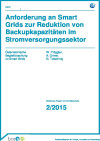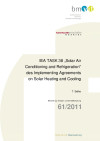Suchergebnisse für "Factsheet: Energietechnologien gestalten, die für alle sinnvoll und nutzbar sind"
Energy Performance Contracting (IEA DSM Implementing Agreement - Task X)
The objective of this task within the IEA DSM programme is to facilitate the use of performance contracts and other energy service company (ESCO) contracts. In this scenario, the ESCO has taken on the project's performance risk by guaranteeing a specified level of energy savings. Its compensation for this risk is directly tied to achieving savings. The financing for such a project could come from the ESCO, the equipment supplier or a third-party company.
Voltage stabilization by central reactive power control of biogas power plants (Virtual Biogas Power Plant)
A virtual power plant, combining 20 agricultural biogas plants is planned in the south-eastern part of the State of Styria (A). The aim of the project is to realize a central reactive power control system of the biogas plants. Active power of this biogas plants ranges between 1 and 3 MW. Specific goals of the project are increasing grid stability, decreasing long distance reactive power transmission, decreasing energy losses, and decreasing utility costs.
Digitization in the construction and real estate industry
In the multitude of digital possibilities, it is very difficult to maintain an overview, to assess trends and potentials, and to recognize correlations. This report therefore aims to describe the current state of the art and the market assessment of promising digital technologies. Information is provided on concrete use cases, added value and challenges of the respective technologies. The analyses presented serve to assess the potential and set the strategic course for the integration of the currently most important digital technologies in the construction and real estate industry.
CO-MOD - Increasing comfort and energy efficiency through improved lighting and air quality in schools - implementation through modular EPC-models and ESCO-networks
In general local educational institutions such as schools and kindergardens have a high average demand for improved comfort and energy efficiency improvements. CO-MOD develops a flexible, modular concept (with provider networks, various financing options incl. "Grandmother"-Energy Services, contract modules) that can also respond to the individual circumstances of smaller objects.
ReCon: Development of a resilient hook-and-loop-fastening-system for the adaptable assembly of building components in the building industry
Systemic examination of the hook-and-loop fastener and building component interfaces for the development of a resilient fastening system between parts/components with different functions and lifespan. The desired result serves to verify the fastening system and forms a basis for further research and establishment in the building industry.
PVOPTI-Ray, Optimization of reflecting materials and photovoltaics in urban environment with respect to energy balance and bioclimate.
Within the scope of the project PVOPTI_Ray the influence of reflection and energy balance on the performance of building integrated photovoltaics (PV) in complex urban environment have been investigated. Equally the influence of PV modules and of the energy conversion of solar energy at the PV module surface has an impact on micro climate and therefore also on pedestrians who are exposed to the radiation fluxes. This was also investigated.
Valuable (by-)products of gasification
19. - 20. October 2022
Living Hotel Kaiser Franz Joseph, Sieveringer Straße 4, 1190 Vienna, AT
The workshop will cover topics such as CHP (combined heat and power) / GHG (greenhouse gas) / synthesis products of gasification.
Anforderung an Smart Grids zur Reduktion von Backupkapazitäten im Stromversorgungssektor

Österreichische Begleitforschung zu Smart Grids
Schriftenreihe
2/2015
W. Prüggler, A. Ortner, G. Totschnig
Herausgeber: BMVIT
Deutsch, 61 Seiten
Downloads zur Publikation
Secondary Materials in the Austrian Textile Industry - Study with Recommendations for the Austrian R&D-Politics
This study deals with the challenges and potentials for the use of secondary materials in the Austrian textile industry. It identifies challenges and potentials for establishing cycles in the textile industry with a focus on the use of secondary materials in Austria based on broad stakeholder involvement. Based on this, recommendations for research and development activities were formulated to promote recycling.
IEA TASK 38 "Solar Air Conditioning and Refrigeration" des Implementing Agreements on Solar Heating and Cooling

Schriftenreihe
61/2011
T. Selke
Herausgeber: BMVIT
Deutsch, 294 Seiten
Downloads zur Publikation
IEA SHC Task 66 Solar Energy Buildings - Industry Workshop
29. September 2022
Kassel, DE
Solar thermal and/or PVT combined with heat pump as a future CO2-neutral energy supply concept
homeVALUE

The ecology and economy of housing. An assessment system for the evaluation of the suitability of buildings and housing estates for the future.
EASEY Venture Capital Transfer
Sensitizing and capacity building for networking of venture capital and developers of sustainability technologies was performed to develop options for establishing a financing platform which regards sustainability requirements.
IEA Bioenergy Webinar Series: Integration of gasification processes in biorefineries
30. June 2022
Online, AT
A webinar on how gasification technology can be used in existing industries/biorefineries.
KoPro Lzk+ - Cost and process optimization in the life cycle of nearly zero energy buildings
The aim of the project was to develop a continuous process chain for the energetic-economic optimization of zero and plus energy buildings. The project focused on proven and new approaches to cost reduction of nearly zero energy buildings (nZEBs) at all stages of the life cycle. The main goal was to identify the extra-costs for nZEBs, and to promote innovative approaches taking into account the cost-effectiveness for all the Stakeholders. A database containing important cost parameters and potential savings will be developed.
IEA SHC Webinar on Renovating Historic Buildings Towards Zero Energy
28. January 2020, 12.00 - 13.30 GMT
Online
Real-world renovation experiences from the perspective of building owners, design teams and SHC Task 59 experts will be presented and discussed.
Bio-Minimum-Lubrication
Development of a Minimum quantity lubrication system employed in metal working industry using an oil-in-water emulsion based on renewable primary products.
e80^3-Buildings - "reconstruction concepts towards energy plus house standard with prefabricated active roof and facade elements, integrated home automation and network integration"
The project aims for highly-efficient renovation of existing buildings and settlements in urban areas. The main focus are buildings that were built between 1950 and 1980.
Energy Demand by Households and Household Characteristics
Analysis of private households' energy expenditures and interrelations between socio-economic characteristics and energy consumption
smartEXT - extended application boundaries for proven passive house technology
The present study aims to explore the application options for compact units (ventilation devices including micro heat pumps, developed for passive houses) in low energy buildings. Compact ventilation units for heat recovery, heating and domestic hot water shall bear the basic heating load, whereas peak loads shall be covered by newly-developed auxiliary heating equipment combined with intelligent control algorithms. This allows increased energy efficiency as well as cost effectiveness together with higher living quality and lower ecological load.
